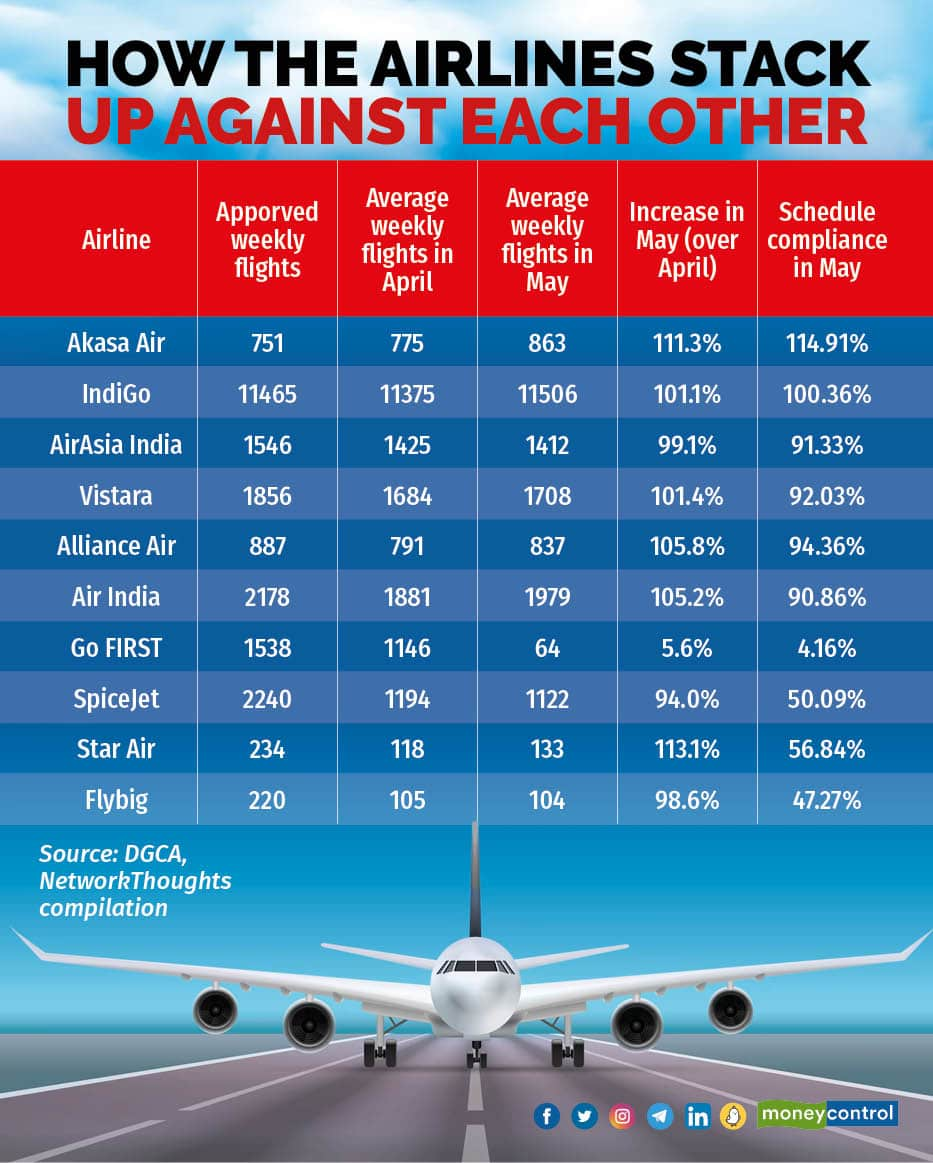



In the early days of May and within days of the country recording its highest-ever single-day count of domestic passengers, Go First pulled a surprise. It suspended operations and stated that it is filing for voluntary bankruptcy. The announcement was unexpected and the situation continues to evolve.
Meanwhile, as Go First tries to defy history and make a comeback, there is little that has changed on the ground for aviation in India, thanks largely to the airline having less than 10 percent market share.
In April, Go First operated an average of 163 daily flights. A look at the overall numbers in May shows that the daily count of flights dropped by an average of 135 flights per day after Go First filed for bankruptcy, indicating that other airlines did increase flights to cater to the shortfall. Come June, airlines dropped some flights and the count was 160 a day lower than in April and 24 a day less than May.
Amidst the eternal stretch between gaining market share, keeping an eye on seasonality and the challenges around aircraft availability and crewing, who really made the most of the situation?
Akasa all the way
The immediate winner was Akasa Air, which increased its flights by 11.3% in May as compared to April. Interestingly, this was without a single new addition in its fleet in that month and entirely on the basis of increased utilisation of its existing fleet.
Akasa Air is also one of only two airlines that utilised all its allocated slots and ended up asking for more. In May, it operated an average of 863 weekly flights, which is 14.91% higher than the 751 weekly departures it had approval for at the beginning of the season. The only other airline to do so was IndiGo, which operated 11,506 weekly flights in May against an approved schedule of 11,465 flights at the beginning of the schedule.
Alliance Air, the only state-owned carrier in the country, came in second and deployed 5.8 percent more flights in May over April. Air India was next with an increase of 5.2 percent. Air India’s compliance stood at 90.86% in May, when it operated an average of 1,979 weekly flights as compared to its approved schedule of 2,178 weekly flights.
Vistara, which is slated to merge with Air India by next March, saw an addition of 24 weekly flights — an increase of 1.4 percent over April. The airline utilised 92 percent of its approved schedule in May. Regional carrier Star Air, which does not have an overlap with Go FIRST routes, saw a 13 percent increase in its schedule in May as it activated the E175s (Embraer aircraft) and launched additional flights.
IndiGo unbeaten in absolute numbers
With 60% market share, IndiGo’s absolute numbers are immense and also mean it has a high base. While IndiGo increased its flights by a mere 1.1 percent in May over April, this translated into 131 more weekly flights. The airline had 100 percent schedule compliance in May and in all probability will only grow from here on.
IndiGo has been battling groundings, just as Go First did, with CXOs admitting that the grounded aircraft were in the 30-40 range at the end of the last quarter. IndiGo continues to take delivery of new aircraft and slowly activate the grounded planes.

So, who’s losing out?
If there is one player that has lost out in the immediate term, it is SpiceJet. The airline started the schedule with an approval for 2,240 weekly flights. It operated 1,122 weekly flights in May, down 6 percent from April, when Go First was also in operation. The airline’s schedule compliance stood at a measly 50%.
SpiceJet has seen settlements with multiple lessors in the past and is activating a few B737s as well as Q400 (Bombardier) planes in the next few weeks, with plans to operationalise more aircraft by the winter schedule. But it continues to be distracted by issues with other lessors and an ongoing case with KAL Airways, the erstwhile owner of the airline.
Flybig, which is largely restricted to the North Eastern states and the East, had a schedule compliance of only 47.27% in May. The regional carrier had no overlap with Go FIRST’s routes and does not stand to gain directly or indirectly from the suspension.
One thing that every airline must be wishing for is more capacity. But then, had it not faced issues with engines, Go First may well have remained a going concern, and the opportunity would not have arisen.
Discover the latest Business News, Sensex, and Nifty updates. Obtain Personal Finance insights, tax queries, and expert opinions on Moneycontrol or download the Moneycontrol App to stay updated!
Find the best of Al News in one place, specially curated for you every weekend.
Stay on top of the latest tech trends and biggest startup news.